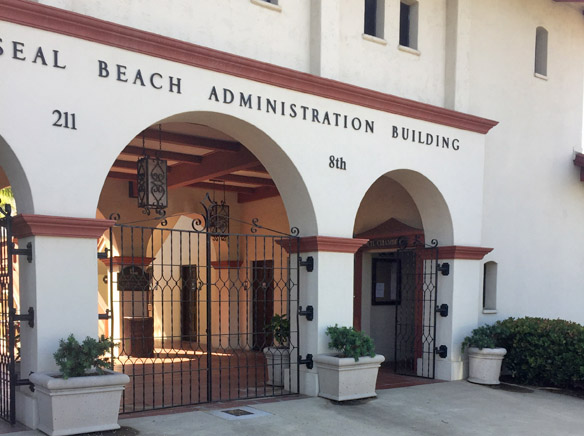Seal Beach is looking at ongoing budget challenges, according to the latest five-year forecast from city staff.
The proposed budget is tight.
According to a slide presented to the June 7 City Council budget workshop, the five-year financial forecast presentation, the forecast city staff uses anticipates deficits in the years 2023-24, 2025-26, 2026-27, and 2027-28. The slide noted that these numbers were preliminary and subject to change. (The Sun asked city officials about the city’s Seal Beach’s financial situation. See page 7)
The finance director said last week at the second budget workshop that the city started the year with a deficit. At a previous budget workshop, the city manager told the council that early in the process, when Seal Beach staff looked at the initial draft budget, they were looking at a deficit of $4.7 million.
(In a June 6 email, Ingram wrote: “It would be accurate to report that the City’s proposed FY 22-23 budget is balanced. However, once we include capital project expenditures, those projects will need to be paid for out of reserves. Capital project expenditures are one-time expenditures, and these types of expenditures are typically paid for out of reserves. Fortunately, primarily due to budgetary savings, we have been able to increase our reserves during the last two fiscal years.” )
The forecast for 2023-24 was a deficit of $451,708.
The forecast for 2027-28 was a deficit of $520,980.
The forecast for 2024-25 was a surplus of $14,636.
Johnson advised the council of the challenges related to the five-year forecast. She said the two people who were familiar with the forecast were no longer with the city.
She described the forecast as a work in progress. “Given the uncertainty of the times we’re in, estimates are a work in progress,” Johnson said.
She also said for revenue projects, a lot of the figures came from the city’s consultants.
Johnson said the current budget is showing a 14% increase in sales tax. According to Johnson, going forward, staff took a more conservative approach for the first of the five-year forecast with a projected growth of 4% and 2% growth in future years.
Johnson said the transient occupancy tax had been hit hardest in recent years.
As for the city’s expenses, Johnson said, “There are a lot of unknowns.”
Johnson said the budget did not include three of the city’s unions.
She said part-time salary increases were in the budget to account for ongoing increases to minimum wage and benefits related to minimum wage.
(Later in the meeting, Johnson said that for 2023-24, staff bumped salaries by 5% because they didn’t have information for three unions.)
Johnson said the forecast was changing. She described the forecast as labor intensive, but if maintained could be very useful.
“My concern is for next year with the $451,000 deficit,” Moore said. (Moore apparently rounded the figure.)
Moore suggested staff show options for revenue and ways to maximize everything.
“I’m fairly certain that’s going to be a trend going forward, to always try and present a balanced budget,” Johnson said.
She also said the city started the year with a deficit she put at more than $4 million. (At the June 2 budget workshop, City Manager Jill Ingram said the city started the budget process with a deficit of $4.7 million.)
District One Councilman/Mayor Joe Kalmick turned the discussion to the city’s transient occupancy (short term rental) tax.
He asked at what point would staff recommend the council begin looking at the number of vacation rentals that the city would allow.
Ingram said staff could bring that back to the council.
She said the city knows from complaints that there are illegal vacation rentals operating that collect transient occupancy tax. She said the city doesn’t have a mechanism for them to remit the money for the city because they don’t have an approved conditional use permit.
(Not all cities use CUPs to regulate vacation rentals. Avalon, for example, recently began the transition from CUPs to licenses for short term rentals.)
Ingram said it would be the council’s discretion to have a discussion.
District Five Councilwoman Sandra Massa-Lavitt wanted to know if it would be worth the effort.
Kalmick said he didn’t want to start a huge controversy for the city and learn the revenue wouldn’t be “significant enough to offset the grief.”
“And we won’t know that until we do the analysis,” Ingram said.
In related news, Assistant City Manager Patrick Gallegos, in a June 7 email, confirmed that the city had hired a new Finance Department director. However, he wrote that the city was conducting a background check on the new hire. He wrote that the city will issue a press release when that is done.












